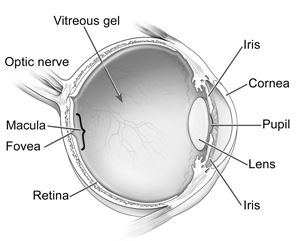Floaters & Flashes
What Are Floaters and Flashes?
Sometimes, we can see small specks or clouds floating across our vision, especially if we’re looking at a plain background. These specks are called floaters, tiny clumps of hyaluronan-2 acid inside the vitreous, the clear gel-like fluid that fills our eyes.
Photo Credit: National Eye Institute, National Institutes of Health
While they look as if they’re floating in front of our eye, they’re actually floating inside the eye. What we see is the shadows they cast on the retina, the layer of cells linking the back of our eyes that senses light and allows us to see. Floaters can be different shapes such as dots, circles, lines, clouds or cobwebs.
Although floaters can occur at any age, they commonly occur as we reach middle age. The vitreous gel starts to thicken or shrink, and forms clumps within the eye. As the vitreous gel pulls away from the back of the wall of the eye, it can cause a posterior vitreous detachment, a common cause of floaters.
The retina can tear if the vitreous gel pulls away from the wall of the eye. This sometimes causes a small amount of bleeding in the eye that may appear as new floaters. Because a torn retina can lead to a vision-threatening retinal detachment, it is important that you see your eye doctor immediately if you notice new floaters, even if you’ve had floaters for years. While some floaters are harmless and either fade over time or become less bothersome, a comprehensive eye examination is the only way to determine if the new floaters are caused by a retinal tear.
If the vitreous gel pulls on the retina, you may see what look like flashing lights or lightning streaks. Since flashes can also be a symptom of a detached retina, you should contact your eye doctor immediately. If your retina is detached, immediate intervention is required to preserve your vision.
How Are Floaters and Flashes Detected?
If you report symptoms of floaters or flashes, your doctor will use a dilated eye examination to determine if these are signs of a retinal tear or detachment. Drops will be placed in your eyes to dilate your pupil and the doctor will examine your retina using an ophthalmoscope.
How Are Floaters and Flashes Treated?
If your doctor determines that the floaters and flashes are not linked to a retinal tear or detachment, no treatment will be required. However, if there is a tear in your retina, laser treatment may be needed to seal the tear and prevent a retinal detachment. If the retina has already detached, surgery will be necessary.
While floaters and flashes can be harmless, they can also be a symptom of a detached retina, a vision-threatening condition that requires prompt intervention. For this reason, it is important that you immediately contact your doctor if you have a sudden onset of new floaters or flashes.
Primary Eye Care Specialists at Kadrmas Eye Care New England
Meet our optometrists who specialize in primary eye care and general eye health:

